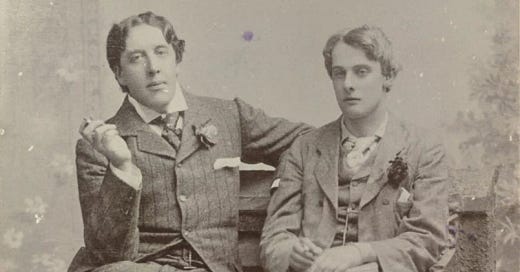Don’t forget: We’re meeting to discuss The Picture of Dorian Gray on the 30th March at 8pm GMT/3pm EST in the Substack chat. Hope to see you there!
It’s impossible to explore The Picture of Dorian Gray without talking about Oscar Wilde, the author, and reflecting on the tragic trajectory of his life.
The novel’s themes of hidden sin and living a double life mirrors Wilde’s own life in such a haunting way. Wilde’s story was a mess of brilliance, vulnerability and ultimate tragedy, and his story is one of the most poignant in literary history.
Oscar Wilde was born in Dublin in 1854 to intellectual parents. His mother, Jane, was a poet, while his father, William, was a surgeon and author of many significant works on medicine. Raised in an ambitious, literary family, Wilde was educated at Trinity College in Dublin before moving to Magdalen College at Oxford University. After this, he moved to London to pursue a literary career.
It was at Oxford that Wilde became involved in the aesthetic movement. As interpreted by Wilde himself, this concept revolved around the ideal that ‘the utility of one's actions should be to create the maximal amount of beauty and pleasure in one's life, and nothing more’. While reading or having finished The Picture of Dorian Gray, you should absolutely be able to spot this ideal.
Wilde’s flamboyant personality and razor-sharp wit made him somewhat of a celebrity in London society. By the late Victorian era, Wilde was one of the most famous writers and playwrights in England.
And yet, beneath this brilliant and shining exterior lay a life of secrecy. Wilde was married to his wife, Constance Wilde, in 1884, and they had two children between then and 1886. But hidden from his public persona, Wilde was a gay man who was living in a society that criminalised homosexuality.
Wilde’s relationship with Lord Alfred Douglas, an aristocrat known commonly as ‘Bosie’, would become the cause of his downfall. Bosie was Wilde’s muse, a tempting figure who drew Wilde away from the safety of his normative, heterosexual relationship—and into a world that he truly wanted.



